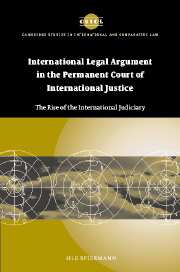 International Legal Argument in the Permanent Court of International Justice
International Legal Argument in the Permanent Court of International Justice Published online by Cambridge University Press: 17 July 2009
Approach and material
In studying international legal argument as unfolding in the decisions of an international court, the question is what to do if one's analysis of the decisions is not to be only superficially about that court. The shifting divisions between the judges, the emergence and decline of what Lauterpacht termed ‘trends and principles’, the varying influence of specific judges over time and the numerous implicit overrulings of former decisions are all interrelated aspects that warrant a chronological analysis of the decisions of the same international court. Of course, no description takes the form of a one-way process of cognition, yet that ought not to prevent lawyers from analysing the decisions of international courts. A model of international legal argument concerned with the practical use of international law in specific cases, as distinct from the Buchrecht, is essential. Account must be taken of the written and oral pleadings of the parties appearing before the international court, yet the focus is on the decisions of, and therefore international legal argument within, the Permanent Court.
On one occasion, having regard to the increasing interest among scholars in commenting on the decisions of the Permanent Court, President Huber suggested to his colleagues that ‘the work in preparing our decisions must be such that if our critics – whether learned men or politicians – could be admitted to the private sittings of the Court, they would remain with the impression that the evolution of our judgments is really worthy of the Court’.
To save this book to your Kindle, first ensure [email protected] is added to your Approved Personal Document E-mail List under your Personal Document Settings on the Manage Your Content and Devices page of your Amazon account. Then enter the ‘name’ part of your Kindle email address below. Find out more about saving to your Kindle.
Note you can select to save to either the @free.kindle.com or @kindle.com variations. ‘@free.kindle.com’ emails are free but can only be saved to your device when it is connected to wi-fi. ‘@kindle.com’ emails can be delivered even when you are not connected to wi-fi, but note that service fees apply.
Find out more about the Kindle Personal Document Service.
To save content items to your account, please confirm that you agree to abide by our usage policies. If this is the first time you use this feature, you will be asked to authorise Cambridge Core to connect with your account. Find out more about saving content to Dropbox.
To save content items to your account, please confirm that you agree to abide by our usage policies. If this is the first time you use this feature, you will be asked to authorise Cambridge Core to connect with your account. Find out more about saving content to Google Drive.